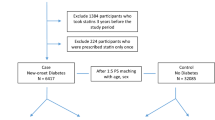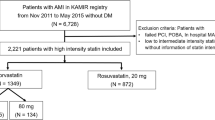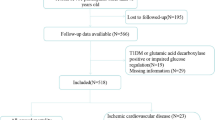Abstract
Background: HMG-CoA reductase inhibitors (statins) have been linked to new-onset diabetes (NOD). Individual statins may differ in the extent to which they increase the risk for NOD; however, the effect of statins on the development of NOD in elderly hypertensive and dyslipidaemic patients has not been well studied.
Objective: The aim of this study was to investigate the relative risk for NOD among elderly (age ≥65 years) hypertensive and dyslipidaemic Taiwanese patients who received different statins.
Methods: This was a retrospective cohort study performed using data from claim forms provided to the central regional branch of the Bureau of National Health Insurance in Taiwan from July 2004 to December 2009. Prescriptions for statins before the index date were retrieved from a prescription database. We estimated the hazard ratios (HRs) of NOD associated with statin use. Non-diabetic subjects served as the reference group.
Results: A total of 2735 NOD cases were identified among 15 637 elderly hypertensive and dyslipidaemic patients during the study period. The risk of NOD after adjusting for sex, age, concomitant medication and mean dose of prescription was lower among users of atorvastatin (HR 0.77; 95% CI 0.71, 0.83) and rosuvastatin (HR 0.65; 95% CI 0.51, 0.82) than among non-users. Patients who took lovastatin (HR 1.38; 95% CI 1.26, 1.50) or simvastatin (HR 1.30; 95% CI 1.14, 1.48) were at higher risk of developing NOD than non-users. Pravastatin and fluvastatin were not associated with increased risk of NOD.
Conclusions: The results of this study suggest that elderly hypertensive and dyslipidaemic patients who take atorvastatin or rosuvastatin are at lower risk of NOD. Lovastatin and simvastatin were associated with a significant increase in the risk of NOD.



Similar content being viewed by others
References
Filippo CD, Cuzzocrea S, Rossi F, et al. Oxidative stress as the leading cause of acute myocardial infarction in diabetics. Cardiovasc Drug Rev 2006; 24: 77–87
Jong GP, Chang MH, Tien L, et al. Antihypertensive drugs and new-onset diabetes: a retrospective longitudinal cohort study. Cardiovasc Drug Rev 2009; 27: 159–63
Freeman DJ, Norrie J, Sattar N, et al. Pravastatin and the development of diabetes mellitus: evidence for a protective treatment effect in the West of Scotland Coronary Prevention Study. Circulation 2001; 103: 357–62
Sever PS, Dahlof B, Poulter NR, et al. Prevention of coronary and stroke events with atorvastatin in hypertensive patients who have average or lower-than-average cholesterol concentrations, in the Anglo-Scandinavian Cardiac Outcomes Trial–Lipid Lowering Arm (ASCOT-LLA): a multicentre randomised controlled trial. Lancet 2003; 361: 1149–58
Collins R, Armitage J, Parish S, et al., for the Heart Protection Study Collaborative Group. MRC/BHF Heart Protection Study of cholesterol-lowering with simvastatin in 5963 people with diabetes: a randomised placebo-controlled trial. Lancet 2003; 361: 2005–16
Kjekshus J, Apetrei E, Barrios V, et al. Rosuvastatin in older patients with systolic heart failure. N Engl J Med 2007; 357: 2248–61
Keech A, Colquhoun D, Best J, et al. Secondary prevention of cardiovascular events with long-term pravastatin in patients with diabetes or impaired fasting glucose: results from the LIPID trial. Diabetes Care 2003; 26: 2713–21
Ridker PM, Danielson E, Fonseca FA, et al. Rosuvastatin to prevent vascular events in men and women with elevated C-reactive protein. N Engl J Med 2008; 359: 2195–207
Sattar D, Preiss D, Murray HM, et al. Statins and risk of incident diabetes: a collaborative: meta-analysis of randomized statin trials. Lancet 2010; 375: 735–42
Sonmez A, Baykal Y, Kilic M, et al. Fluvastatin improves insulin resistance in nondiabetic dyslipidemic patients. Endocrine 2003; 22: 151–4
Downs JR, Clearfield M, Weis S, et al. Primary prevention of acute coronary events with lovastatin in men and women with average cholesterol levels: results of AFCAPS/TexCAPS. Air Force/Texas Coronary Atherosclerosis Prevention Study. JAMA 1998; 279: 1615–22
Sasaki J, Iwashita M, Kono S. Statins: beneficial or adverse for glucose metabolism. J Atheroscler Thromb 2006; 13: 123–9
Mascitelli L, Pezzetta F, Goldstein MR. Statins and risk of incident diabetes. Lancet 2010; 375: 2140–1
Scandinavian Simvastatin Survival Study Group. Randomised trial of cholesterol lowering in 4444 patients with coronary heart disease: the Scandinavian Simvastatin Survival Study (4S). Lancet 1994; 344: 1383–9
Nakata M, Nagasaka S, Kusaka I, et al. Effects of statins on the adipocyte maturation and expression of glucose transporter 4 (SLC2A4): implications in glycaemic control. Diabetologia 2006; 49: 1881–92
Coleman CI, Reinhart K, Kluger J, et al. The effect of statins on the development of new-onset type 2 diabetes: a meta-analysis of randomized controlled trials. Curr Med Res Opin 2008; 24: 1359–62
Sheikh K. Statins and risk of incident diabetes. Lancet 2010; 375: 2139–40
Rajpathak SN, Kumbhani DJ, Crandall J, et al. Statin therapy and risk of developing type 2 diabetes: a meta-analysis. Diabetes Care 2009; 32: 1924–9
Xia F, Xie L, Mihic A, et al. Inhibition of cholesterol biosynthesis impairs insulin secretion and voltage-gated calcium channel function in pancreatic beta-cells. Endocrinology 2008; 149: 5136–45
Mascitelli L, Pezzetta F, Goldstein MR. Does intensive cholesterol lowering increase the risk of diabetes? Int J Clin Pract 2009; 63: 1808–9
Grundy SM, Cleeman JI, Merz CNB, et al. Implications of recent clinical trials for the National Cholesterol Education Program Adult Treatment Panel III Guidelines. Circulation 2004; 110: 227–39
Acknowledgements
Dr Yi-Sheng Liou and Dr Gwo-Ping Jong contributed to the article equally.
This study was supported by the central region branch of the Bureau of National Health Insurance, and by a grant from the Taichung Armed Forces General Hospital in Taiwan. The authors have no conflicts of interest that are directly relevant to the content of this article.
Author information
Authors and Affiliations
Corresponding author
Rights and permissions
About this article
Cite this article
Ma, T., Chang, MH., Tien, L. et al. The Long-Term Effect of Statins on the Risk of New-Onset Diabetes Mellitus in Elderly Taiwanese Patients with Hypertension and Dyslipidaemia. Drugs Aging 29, 45–51 (2012). https://doi.org/10.2165/11597250-000000000-00000
Published:
Issue Date:
DOI: https://doi.org/10.2165/11597250-000000000-00000




